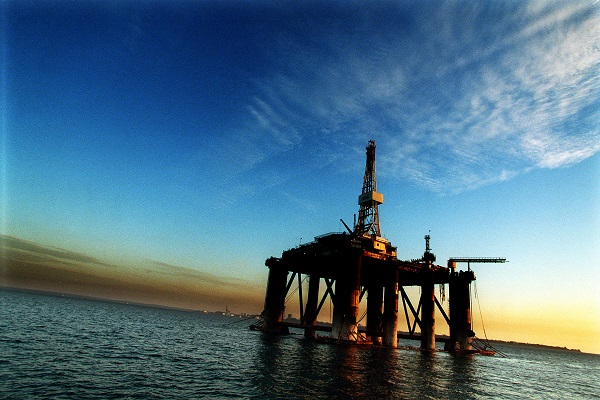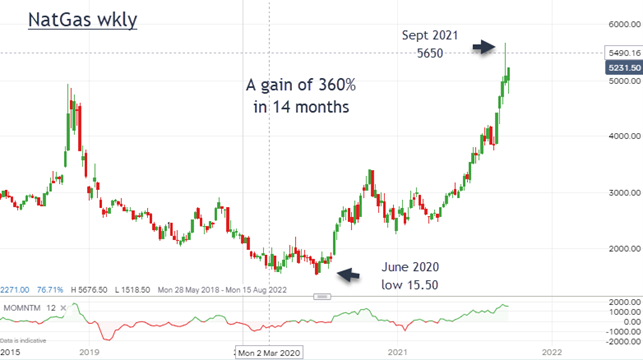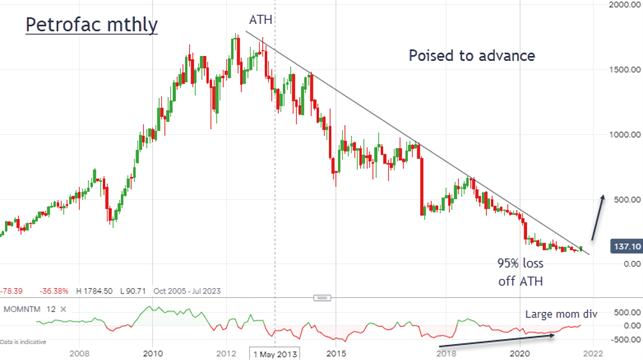Chart of the week: is Petrofac share price boom just the beginning?
27th September 2021 10:49
by John Burford from interactive investor
Our charts expert looks at how oil firm Petrofac is shaping up as energy prices rise.

This large international oil and gas services company has been embroiled in a long-running bribery scandal for the procurement of Middle Eastern contracts.
With the dead weight of that overhanging its shares – and the ongoing policy of governments to bear down on the fossil fuel industry in favour of 'renewables' - is it any wonder the share price has suffered greatly?
So why am I taking a hard look at Petrofac Ltd (LSE:PFC) as a candidate for my Buy Low/Sell High list?
First off, the shares have sunk from a high of £18 in 2012 to a 90p low set in May this year – a decline of 95% in nine years. Anyone investing since 2012 has seen nothing but losses and as a result, buying interest has fallen off a cliff.
And that is a great backdrop for a potentially massive short squeeze! And last week, it was announced the company has at last reached a settlement of the bribery case with the Serious Fraud Office – and one of the weights is now being lifted.
That news boosted the shares by 25% in one day and was a confirmation that short sellers were starting to cover.
- Stockwatch: has this oil and gas explorer turned the corner?
- Lloyds Bank shares: better times ahead?
- Read more articles by John Burford here
- Read our six-part series on charting for beginners
But secondly, the real kicker here is in the form of the booming energy markets.
With little electricity generation recently in Europe from wind (which failed to blow), natural gas (and coal!) has been called on to plug the gap, so exposing the fragile nature of the current headlong political rush into 'renewables' and away from fossil fuels and nuclear.
That extra demand for gas is showing up in the price action. Here is the Natural Gas chart showing the stunning increase of 360% in 14 months.

Past performance is no guide to future performance.
And crude oil is following a similar path. So, with rising demand along with rising prices, will there be a move to exploit these high prices by oil and gas companies increasing their exploration and development budgets? That would be the normal economic path and would be a no-brainer if many Western governments were not so committed to killing off the industry.
But non-Western oil and gas companies do not feel so constrained and would likely be planning now to call in companies such as Petrofac.
The high prices are sending the usual economic message that the world needs more Natural Gas, not less.
Naturally, this is in direct opposition to the Net Zero goals of Western governments. Pretty soon, something will have to give politically and it is usually the markets that win that battle. Can any government survive a replay of the 1970s Winter of Discontent?
- Big moves for Rolls-Royce and Centrica
- Subscribe to the ii YouTube channel for our latest interviews
- Open an ISA with interactive investor. Click here to find out how
And with the shadow of the bribery scandal lifting (with exquisite timing, please note!), Petrofac can now bid openly for work.
Two weeks ago, I highlighted the building pressure to promote nuclear energy to secure baseload generating capacity and today, it has been announced that the UK will order Rolls-Royce Holdings (LSE:RR.) reactors (now alarmingly dubbed 'mini nukes'), thus bowing to the inevitable. I remain bullish on the shares.
But that will not solve the short and medium-term energy problems – and reliance on natural gas will be required for the foreseeable future.
So, is it possible some North Sea fields will be re-opened? And is it possible fracking on the mainland will now be permitted? Or will a word in Mr Putin's ear get more gas to flow from Russia? Hah!
If so, then last week's surge above the major trendline (barely visible on the monthly chart) could start a major rally phase with my first target at the £7 region.

Past performance is no guide to future performance.
John Burford is the author of the definitive text on his trading method, Tramline Trading. He is also a freelance contributor and not a direct employee of interactive investor.
These articles are provided for information purposes only. Occasionally, an opinion about whether to buy or sell a specific investment may be provided by third parties. The content is not intended to be a personal recommendation to buy or sell any financial instrument or product, or to adopt any investment strategy as it is not provided based on an assessment of your investing knowledge and experience, your financial situation or your investment objectives. The value of your investments, and the income derived from them, may go down as well as up. You may not get back all the money that you invest. The investments referred to in this article may not be suitable for all investors, and if in doubt, an investor should seek advice from a qualified investment adviser.
Full performance can be found on the company or index summary page on the interactive investor website. Simply click on the company's or index name highlighted in the article.
Disclosure
We use a combination of fundamental and technical analysis in forming our view as to the valuation and prospects of an investment. Where relevant we have set out those particular matters we think are important in the above article, but further detail can be found here.
Please note that our article on this investment should not be considered to be a regular publication.
Details of all recommendations issued by ii during the previous 12-month period can be found here.
ii adheres to a strict code of conduct. Contributors may hold shares or have other interests in companies included in these portfolios, which could create a conflict of interests. Contributors intending to write about any financial instruments in which they have an interest are required to disclose such interest to ii and in the article itself. ii will at all times consider whether such interest impairs the objectivity of the recommendation.
In addition, individuals involved in the production of investment articles are subject to a personal account dealing restriction, which prevents them from placing a transaction in the specified instrument(s) for a period before and for five working days after such publication. This is to avoid personal interests conflicting with the interests of the recipients of those investment articles.